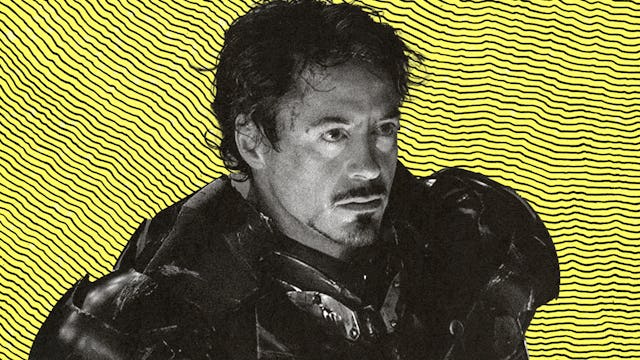In 2008, Iron Man felt like a subversive entry into the Marvel universe. Now it should be remembered as military propaganda.


‘Iron Man’ was always the story of a good guy with a gun
Hits Different is a new series that takes a second look at a TV show, song, album, episode, movie, scene, or clip from the past that, in our current context, just hits different. What was the world like when you first considered this piece of culture, and what’s changed? Does it hold up as timeless, or is it better left to the past? Pitch us at features@mic.com.
If you take a look at the current shape of Hollywood — an IP landfill churning out reboots, franchises, and spinoffs — and attempt to trace a line back to where that landscape began to take form, you’d more or less land on a single movie from 2008. When Iron Man was in the works, it was seen as a risky film, the first movie for a nascent Marvel Studios based on a somewhat lesser-known hero. Now, it’s known as the launchpad for the Marvel Cinematic Universe, a historic tentpole for the most lucrative film franchise of all time, which in itself has, more than any cultural phenomenon, helped steer what Hollywood now makes and what its audiences will reliably go see. In retrospect, that mythos around the film is warranted; Iron Man remains a well-crafted blockbuster that goes down easy and sets the narrative tone for the two dozen or so superhero flicks that would follow. It’s a film that you can immediately recognize as the revitalization of Robert Downey Jr.’s career. But a recent cable TV rewatch, particularly on the heels of the U.S. stumbling its way out of Afghanistan, means seeing the film more clearly than ever as muddled military propaganda, even as it purports to be the opposite.
There is a version of this charge of imperialist propaganda that has been leveled at not only all of the MCU but at the concept of the superhero writ-large: Beneath the cape or cowl, superheroes embody a display of unfettered power and violence carried out according to the hero’s version of moral good. But Iron Man, more than any suspect, is the superhero film that, at the time, directly and radically grappled with themes of military power and American intervention.
When Iron Man hit theaters in 2008, the American public’s view of the military’s involvement in the Middle East existed in a gray area. The nation’s attitude had at least somewhat tempered from the aggressively jingoistic post-9/11 ethos: On his way out of office, Bush had made an agreement that created a path for the U.S. military to exit Iraq, and questions around the Blackwater massacre (the dubious circumstances behind an American team of private military contractors and the murder of 17 Iraqi civilians) and the military-industrial complex were a major source of political debate. It was a liminal period — two years after the filmmaker Paul Greengrass (the director behind the Bourne franchise) made his 2006 9/11 ode United 93, but two years before his subsequent 2010 film Green Zone, a shaky-cam exposé that tracked a harried Matt Damon uncovering the American lie of “weapons of mass destruction,” a somewhat remarkable political stance for a major studio movie when the country had yet to end its war there.
Yet, simultaneously, the show 24, which glorified Jack Bauer as a counterterrorism officer who tortured suspects in order to save lives, was deep into its multi-season, Emmy-winning run. And films like The Hurt Locker, Katheryn Bigelow’s critically acclaimed, Oscar-winning profile of an American soldier who disables bombs to save Iraqi civilians, served as an exercise in a certain humble, naturalistic form of military hero-worship that conveniently elided any questions about the atrocities that the American military had introduced to the country.
Iron Man arrived to fit perfectly in this political in-between zone and is quick to announce itself as such. The film opens with a shot of an arid desert in Afghanistan, a trail of Army humvees barreling through the landscape, set to the flexing score of AC/DC’s iconic “Back in Black.” But we are soon meant to see that this particular rock-and-roll gung-ho glorification is actually bad. When Tony Stark takes a photo with a soldier throwing up a peace sign, the billionaire arms dealer quips, “I love peace. I’d be out of a job with peace.” Then, on cue, he and his Army escorts are ambushed by an enemy who, we soon learn, uses the very weapons manufactured by Tony’s own Stark Industries. Tony is captured, bloodied, and plopped in front of a group of veiled militants like a terrorist-hostage video, right before the Iron Man title card drops.
It is a bold introduction, particularly when you consider the political context of a post-9/11 America in 2008. Is this film going to set up the rise of Iron Man as a gross anti-terrorist allegory for the nobility of our invasion of Afghanistan? Of course not, the film winks. Iron Man is smarter than that, using the aesthetics of a terrorist-hostage setup to actually denounce warmongering.
Tony Stark is a cool, wise-cracking, but also morally bankrupt “war profiteer,” as one character puts it in a flashback scene that follows. As a hostage, one of his captors tells him it is an honor to meet the most famous mass murderer in the history of America. This Tony, the swaggering American weapons magnate, might be reasonably considered a terrorist himself.
But that version of Tony soon dies in the cave in Afghanistan. When he is in captivity, building what is ultimately a prototype for the Iron Man suit, he is assisted by Yinsen, a humble man from a small village called Gulmira. We learn that he lost his family in the war, presumably killed by terrorists whose heinous acts are supplied by Tony’s deadly inventions. Later, when Tony escapes he tells the press, “I saw young Americans killed by the very weapons I created to defend them and protect them. And I saw that I had become part of a system that is comfortable with zero accountability.” The subtext up through this point can be seen as a surprisingly scathing indictment of the military industrial complex, making a seemingly direct parallel to the history of American overreach and U.S. arms landing in the hands of Al Qaeda and the Taliban. After announcing his revelations, Tony claims to shut down Stark Industries.
This is all well and good so far. But Tony’s disavowal of weaponry and war is just a diversion to his focus on creating what becomes the Iron Man suit — simply another weapon of mass destruction and the most potent agent of war of all. The film is close to unwittingly calling itself out, as its villain and Tony’s business partner Obadiah Stone (Jeff Bridges) gives us the pulpy one-liner toward the end of the film, “How ironic, Tony! Trying to rid the world of weapons, you gave it its best one ever.” The real crime is not in fact war-profiteering or weapons manufacturing — though the film claims to largely be about condemning this — but refusing to ensure that deadly weapons are in the “right hands.”
Obadiah is later revealed to be the villain when we realize that he has been “double-dealing,” selling arms directly to both sides of the battlefield. Not long after, as he leaves Tony for dead, Obadiah peers greedily at the arc reactor that powers the Iron Man suit, an innovation that he says will fuel “weapons that will help steer the world back on course, put the balance of power back in our hands — the right hands.” The line, summarizing a villainous ideology, sounds awfully familiar to another line uttered by our very own superhero earlier in the film. “I don’t want this winding up in the wrong hands,” Tony says as he’s poring over the blueprints to the Iron Man suit. “Maybe in mine it could actually do some good.” These two American industrialists, it seems, are one and the same.
When Tony sees on the news that his former captors have violently occupied Gulmira, the village that Yinsen was from, he dons the fully finished Iron Man suit for the first time, flying to Afghanistan in the name of doing some good. Upon his arrival, the confronted terrorists hold innocent civilians at gunpoint, before Iron Man deploys a precise weapon that shoots and kills only the bad guys. Freed from these captors, a boy runs into the arms of his sobbing father.
It’s all a neat portrait of American heroism — and, in 2008, a version of what much of the nation was swayed to believe the U.S. military was doing in Afghanistan. Of course, the reality is much messier and bloodier: last month, the day before the last American troops officially exited Afghanistan, an errant American drone missile, one of our most modern pieces of advanced weapon technology, killed seven children. As Tony Stark becomes disenchanted with the American war machine, he becomes the ultimate symbol and unilateral administer of it — doling out justice according to his own interests or version of righteousness. There are bad warmongers and good warmongers — better to be a good guy with a gun.
Iron Man was partially funded by the Pentagon; its credits include a special thanks to a “Pentagon liaison officer” who reviewed the entire script, offering access and equipment only if the final screenplay is approved and represents the military according to its own standards. For all of its thematic considerations of military force, Iron Man was still Pentagon-approved because it is an endorsement for an American paradigm of justice: there can be good, ethical war. Vilification is thrust upon a private military contractor — Obadiah and his version of Stark Industries — and not the U.S. government itself. In fact, Tony’s closest friend is Colonel James Rhodes (Terrance Howard), the film’s proxy for the U.S. military, is an honorable service member whose finger-wagging is that of a good-natured ally. And in later films, Rhodes, of course, becomes his own superhero called, wait for it — War Machine.
None of this necessarily takes away from Iron Man as a good ol’ fashioned popcorn romp. If you don’t squint too hard, it’s a nice orchestra of superhero myth-making and a delight to watch Downey Jr. carve out an indelible impression of Tony Stark. But it’s worth considering what we’re truly, even subliminally, cheering for when we cheer for Iron Man, and ultimately for those within the rest of the MCU. The theme of unchecked militarism returns in later films, even more pointedly, although removed from the thornier political context of the Middle East. “What would you call a group of U.S. based enhanced individuals who routinely ignore sovereign borders and inflict their will wherever they choose and who frankly seem unconcerned about what they leave behind?” a senator asks the Avengers in Captain America: Civil War. The film centers, in fact, on the idea of reigning in their powers, as they are confronted with the innocent lives that come at the cost of their heroism. But the same twisted logic from Iron Man returns.
“When I realized what my weapons were capable of in the wrong hands, I shut it down and stopped manufacturing,” Tony tells Captain America as they debate whether to submit to a treaty that will submit the Avengers to state regulation — a treaty that, despite all their ethical pondering, the heroes ultimately ignore in their unimpeachable quest to do good. “We may not be perfect,” replies Captain America, our quintessential symbol of patriotism and moral rectitude and the First Avenger literally engineered by the U.S. military itself. “But the safest hands are still our own.”